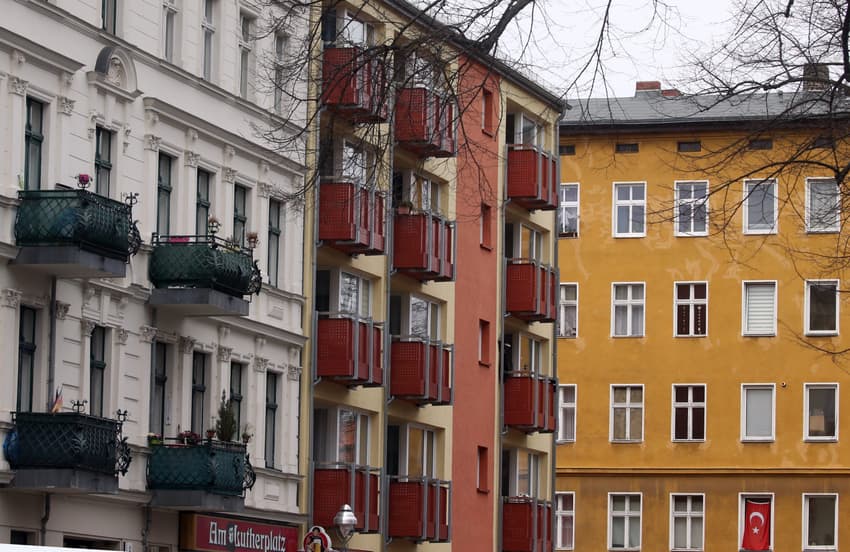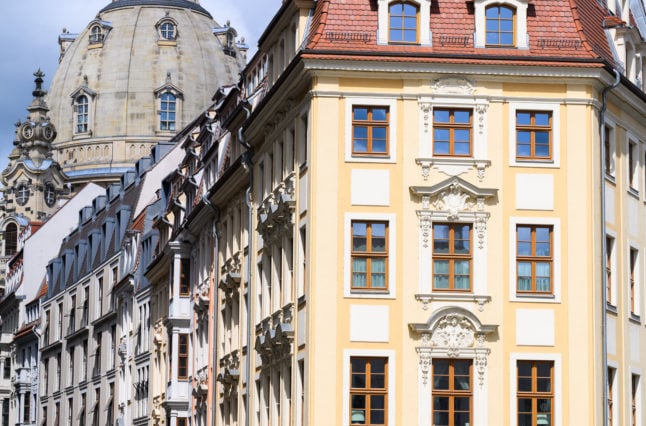EXPLAINED: How property prices are dropping in major German cities

Germany's property market is becoming a friendlier place for buyers as prices continue to drop in major cities - but renters are still feeling the squeeze.
Looking to move? Find your next rental apartment here.
What's going on?
The current economic situation appears to have had an effect on Germany's housing market in recent months: demand for properties has been tailing off amid interest rate hikes and the cost of living crisis.
According to a recent study by property search portal ImmoScout24, the number of people buying houses in Germany fell dramatically in the second quarter of 2022.
In many of the major metropoles, property prices also went down as people struggled to find interested buyers. In particular, properties for sale in Düsseldorf, Frankfurt, Hamburg, Cologne, Munich and Stuttgart fell in asking price by as much as 6.6 percent.
READ ALSO: How Germany’s property boom could be slowing down
With the exception of Berlin, a single-family house cost significantly less by the end of June in almost all German cities surveyed by the portal.
In Cologne, for example, prices fell by four percent within three months, while in the pricy city of Stuttgart they dropped by 6.6 percent.
Prices for existing (rather than new-build) flats stagnated in Munich, Stuttgart and Hamburg, while they continued to rise in Berlin, Düsseldorf and Cologne.
Outside of the cities, the nationwide trend in property prices - i.e. including smaller towns and the countryside - still pointed slightly upwards overall.
But the price increases, which averaged two percent compared to the previous quarter, were nowhere near as high as they have been in recent years.
Is this part of a longer term trend?
It seems like it could be the beginning of the end of spiralling house prices in the Bundesrepublik.
Explaining the latest figures, ImmoScout24 managing director Thomas Schroeter said the property market in Germany was currently undergoing a price correction after years of inflated prices.
This can be attributed to a perfect storm of factors that includes high construction costs, high inflation and significantly higher interest rates, which make borrowing for a mortgage more expensive.
"The real estate market is in a phase of adjustment to the new economic reality, which in the buyer's market is characterised above all by the new interest rate level," Schroeter said. "For the first time since the financial crisis in 2008, we are seeing significant price corrections, especially for new-build flats and single-family homes in existing and new buildings."
This is largely to do with the major drop in demand for houses: the number of buyers on the real estate portal has fallen by 36 percent compared to last year, while the number of advertised offers has increased by 46 percent.
"It is currently much more difficult for sellers to find buyers for their property offers," Schroeter explained.
Meanwhile, advertisements for properties are also remaining online for longer than they previously did.
READ ALSO: EXPLAINED: What you need to know about buying property in Germany
Is this good news for buyers?
That all depends on how much money they have to spare - and how much they need to borrow.
Buyers with capital will certain benefit from the lower prices and the fact that sellers seem to be a lot more willing to negotiate on the price at the moment.
On the other hand, the current interest rates on mortgages - which are now over three percent - are making it hard for those who need to borrow money to make it onto the housing ladder.
"The monthly instalments have doubled in price compared to last year's low interest rates for a typical financing model," Schroeter explained.

Rampische Straße in Dresden Old Town. Photo: picture alliance/dpa | Robert Michael
What are the cheapest and most expensive cities?
It may seem unbelievable for those who live in the capital, but Berlin, along with Cologne, are the cheapest German metropoles to buy property in.
In Cologne, buyers pay an average of €4,626 per square metre for an existing flat and around €4,933 per square meter for a house. In Berlin, a flat will set you back an average of €4,675 per square metre and a house costs around €5,094 per square metre.
Munich remains by far the most expensive city, with flats in the Bavarian capital costing €7,870 per square metre and houses costing €8,542 per square metre. The next most expensive cities were Frankfurt and Stuttgart, followed by Hamburg and Düsseldorf.
However, the cheapest option for getting on the housing ladder in Germany is to buy outside of the major cities. While houses in most metropoles will set you back more than €5,000 per square metre, the national average is just €3,041 per square metre.
READ ALSO: Where in Germany can you still snag a home for under €100k?
What's going on in the rental market?
Thanks to the fact that buying is increasingly out of the average person's price range, rents are currently getting hiked up all over Germany.
According to Immoscout24, there was a 48 percent increase in demand for rental apartments in the second quarter of 2022, and the platform's WohnBarometer shows that the asking prices for rental flats across Germany are climbing at the steepest rate in years.
According to the survey, existing flats for new rentals were on average 2.7 percent more expensive than at the beginning of the year. For newly built flats, rents went up by 3.6 percent.
The national average for asking rents for existing flats was €7.66 per square metre and €10.59 per square metre for new-build flats.
Comments
See Also
What's going on?
The current economic situation appears to have had an effect on Germany's housing market in recent months: demand for properties has been tailing off amid interest rate hikes and the cost of living crisis.
According to a recent study by property search portal ImmoScout24, the number of people buying houses in Germany fell dramatically in the second quarter of 2022.
In many of the major metropoles, property prices also went down as people struggled to find interested buyers. In particular, properties for sale in Düsseldorf, Frankfurt, Hamburg, Cologne, Munich and Stuttgart fell in asking price by as much as 6.6 percent.
READ ALSO: How Germany’s property boom could be slowing down
With the exception of Berlin, a single-family house cost significantly less by the end of June in almost all German cities surveyed by the portal.
In Cologne, for example, prices fell by four percent within three months, while in the pricy city of Stuttgart they dropped by 6.6 percent.
Prices for existing (rather than new-build) flats stagnated in Munich, Stuttgart and Hamburg, while they continued to rise in Berlin, Düsseldorf and Cologne.
Outside of the cities, the nationwide trend in property prices - i.e. including smaller towns and the countryside - still pointed slightly upwards overall.
But the price increases, which averaged two percent compared to the previous quarter, were nowhere near as high as they have been in recent years.
Is this part of a longer term trend?
It seems like it could be the beginning of the end of spiralling house prices in the Bundesrepublik.
Explaining the latest figures, ImmoScout24 managing director Thomas Schroeter said the property market in Germany was currently undergoing a price correction after years of inflated prices.
This can be attributed to a perfect storm of factors that includes high construction costs, high inflation and significantly higher interest rates, which make borrowing for a mortgage more expensive.
"The real estate market is in a phase of adjustment to the new economic reality, which in the buyer's market is characterised above all by the new interest rate level," Schroeter said. "For the first time since the financial crisis in 2008, we are seeing significant price corrections, especially for new-build flats and single-family homes in existing and new buildings."
This is largely to do with the major drop in demand for houses: the number of buyers on the real estate portal has fallen by 36 percent compared to last year, while the number of advertised offers has increased by 46 percent.
"It is currently much more difficult for sellers to find buyers for their property offers," Schroeter explained.
Meanwhile, advertisements for properties are also remaining online for longer than they previously did.
READ ALSO: EXPLAINED: What you need to know about buying property in Germany
Is this good news for buyers?
That all depends on how much money they have to spare - and how much they need to borrow.
Buyers with capital will certain benefit from the lower prices and the fact that sellers seem to be a lot more willing to negotiate on the price at the moment.
On the other hand, the current interest rates on mortgages - which are now over three percent - are making it hard for those who need to borrow money to make it onto the housing ladder.
"The monthly instalments have doubled in price compared to last year's low interest rates for a typical financing model," Schroeter explained.

What are the cheapest and most expensive cities?
It may seem unbelievable for those who live in the capital, but Berlin, along with Cologne, are the cheapest German metropoles to buy property in.
In Cologne, buyers pay an average of €4,626 per square metre for an existing flat and around €4,933 per square meter for a house. In Berlin, a flat will set you back an average of €4,675 per square metre and a house costs around €5,094 per square metre.
Munich remains by far the most expensive city, with flats in the Bavarian capital costing €7,870 per square metre and houses costing €8,542 per square metre. The next most expensive cities were Frankfurt and Stuttgart, followed by Hamburg and Düsseldorf.
However, the cheapest option for getting on the housing ladder in Germany is to buy outside of the major cities. While houses in most metropoles will set you back more than €5,000 per square metre, the national average is just €3,041 per square metre.
READ ALSO: Where in Germany can you still snag a home for under €100k?
What's going on in the rental market?
Thanks to the fact that buying is increasingly out of the average person's price range, rents are currently getting hiked up all over Germany.
According to Immoscout24, there was a 48 percent increase in demand for rental apartments in the second quarter of 2022, and the platform's WohnBarometer shows that the asking prices for rental flats across Germany are climbing at the steepest rate in years.
According to the survey, existing flats for new rentals were on average 2.7 percent more expensive than at the beginning of the year. For newly built flats, rents went up by 3.6 percent.
The national average for asking rents for existing flats was €7.66 per square metre and €10.59 per square metre for new-build flats.
Join the conversation in our comments section below. Share your own views and experience and if you have a question or suggestion for our journalists then email us at [email protected].
Please keep comments civil, constructive and on topic – and make sure to read our terms of use before getting involved.
Please log in here to leave a comment.